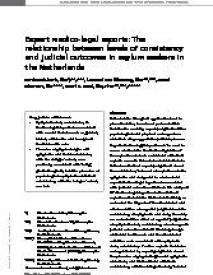Expert medico-legal reports: The relationship between levels of consistency and judicial outcomes in asylum seekers in the Netherlands
Introduction: If asylum applicants need to prove that they have been persecuted in their home country, expert judgment of the psychological and physical consequences of torture may support the judicial process. Expert medico-legal reports can be used to assess whether the medical complaints of the asylum seeker are consistent with their asylum account. It is unclear which factors influence medical expert judgement about the consistency between an asylum seeker’s symptoms and story, and to what extent expert medico-legal reports are associated with judicial outcomes.
Methods: We analysed 97 medico-legal reports on traumatised asylum seekers in the Netherlands. First, we evaluated the impact of trauma-related and other variables on experts’ judgments of the consistency of symptoms and story. Second, we evaluated the effect of experts’ judgments of symptom-story consistency on subsequent judicial outcomes.
Results: Gender, receipt of mental health care and trauma-related variables were associated with symptomstory consistency. Positive asylum decisions were predicted by expert judgments about the presence of physical signs and symptoms of torture, and ill-treatment and their consistency with the refugee’s story, but not psychological symptoms.
Conclusion: These results suggest that standardised procedures for the documenting of medical evidence by independent experts can improve judicial decision quality and the need to improve psychological and psychiatric assessments.
Key points of interest
• Symptom-story consistency in medico-legal reports is associated with several factors such as gender, history of trauma and receipt of mental health care.
• Presence of physical signs and symptoms and their consistency with the refugee’s story was positively associated with being granted asylum, but the presence of psychological symptoms and their consistency with the refugee’s story was not.
Geachte bezoeker,
De informatie die u nu opvraagt, kan door psychotraumanet niet aan u worden getoond. Dit kan verschillende redenen hebben,
waarvan (bescherming van het) auteursrecht de meeste voorkomende is. Wanneer het mogelijk is om u door te verwijzen naar de bron
van deze informatie, dan ziet u hier onder een link naar die plek.
Als er geen link staat, kunt u contact opnemen met de bibliotheek,
die u verder op weg kan helpen.
Met vriendelijke groet,
Het psychotraumanet-team.
In: Torture Journal: Journal on Rehabilitation of Torture Victims and Prevention of Torture ISSN : 1997-3322 | 29 | 1 | 36-46
https://doi.org/10.7146/torture.v29i1.111205


